Strangers in their own Land
Beijing has branded them part of the "Bin Laden Clique," making human rights monitors worry that China is stepping up repression of its own Muslim minority. But Uighurs say things in the distant Wild West remain unchanged, meaning miserable and hopeless.
By Ron Gluckman /Kashgar, Turpin, Urumchi and around Xinjiang, China
ABDULLAH AHMED KNOWS WHAT IT FEELS LIKE to be an outsider. A decade after leaving his home in China, Ahmed is a successful businessman in Dubai. He drives a luxury utility vehicle, and his son attends an expensive international school.
Yet strict laws keep Dubai's huge foreign population, which outnumbers the locals about 4 to 1, as second-class citizens. "We cannot buy property, so we flush away our money in rents," he laments. "We have no real rights, even those who have been in Dubai for generations."
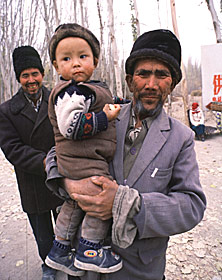 Returning home, however, provides no solace. Even in his own country, Ahmed
often feels like an outcast. Arriving in Beijing recently, he faced hassles as
soon as he stepped off the airplane.
Returning home, however, provides no solace. Even in his own country, Ahmed
often feels like an outcast. Arriving in Beijing recently, he faced hassles as
soon as he stepped off the airplane.
"Hotels wouldn't accept me," he says. "They said they had rooms when I first called, but they lied about being full as soon as they saw me."
That's because, despite his Chinese passport, both his appearance and his name give him away as a Uighur, a member of a Turkic-speaking and mostly Muslim minority that populates China's westernmost Xinjiang-Uighur Autonomous Region.
Underlining his sense of alienation was the fact that he had to leave China in order to reach his hometown of Kashgar. Because he couldn't get direct flights, he flew from Beijing to Bishkek, Kyrgyzstan, before traversing treacherous mountain passes to Xinjiang by hired car. "Sometimes the strangest thing," he says, "is to be a stranger in your own land."
It is a sensation that has intensified since the Sept. 11 World Trade Center attacks. As the U.S. wages an antiterrorist war in Afghanistan, China has been seeking international support for its own campaign against Uighur separatists in Xinjiang - by painting them as terrorists with overseas links.
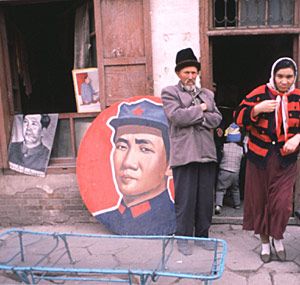 The anti-separatist rhetoric from Beijing has grown increasingly strident in recent
weeks, with Foreign Ministry spokesman Zhu Bangzhao claiming there was proof
linking Uighur agitators with "the bin Laden clique."
The anti-separatist rhetoric from Beijing has grown increasingly strident in recent
weeks, with Foreign Ministry spokesman Zhu Bangzhao claiming there was proof
linking Uighur agitators with "the bin Laden clique."
Meanwhile, two Xinjiang separatists were reportedly executed and a number of others sentenced to jail. "They [Beijing leaders] want to take advantage of this situation and clean house," says Dru Gladney, a Central Asia expert at the Asia-Pacific Center for Security Studies in Hawaii.
While there is little evidence so far that repression has actually worsened in Xinjiang, Beijing's tough posturing can only add to the resentment felt by an already disgruntled Uighur populace.
The stepping up of Beijing's propaganda efforts reflects its deep-seated sense of insecurity in Xinjiang, and no wonder. The province today exists in an apartheid-like state, with its Uighur and Han Chinese residents leading separate - and, grumble locals, unequal - lives.
Few of the province's estimated 8 million Uighurs speak the national language of Mandarin. They are educated in their own tongue in Uighur schools. They are treated in Uighur hospitals that they claim are sub-par.
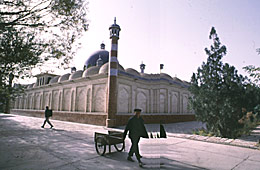 They live in crowded neighborhoods of medieval mud-brick
houses, which contrast with the modern white-tile blocks catering to Chinese
immigrants. The newcomers dine almost exclusively in Chinese restaurants;
Uighurs patronize their own eateries, which are devoid of Chinese clientele. The
two people rarely work together, intermarry even less.
They live in crowded neighborhoods of medieval mud-brick
houses, which contrast with the modern white-tile blocks catering to Chinese
immigrants. The newcomers dine almost exclusively in Chinese restaurants;
Uighurs patronize their own eateries, which are devoid of Chinese clientele. The
two people rarely work together, intermarry even less.
That's how it has been ever since the Chinese liberated - locals say conquered - Xinjiang (meaning "new frontier" in Mandarin) soon after World War II, ending the short-lived independent Uighur state of East Turkestan.
To Uighurs, who tamed the desert and built vibrant trading towns along the Silk Road, the only thing new about this frontier is the arrival of Chinese in large numbers.
Even today, residents of desert outposts like Khotan and Korla live as they have for centuries, funneling precious water in ancient aqueducts to fields bursting with grapes and apricots.
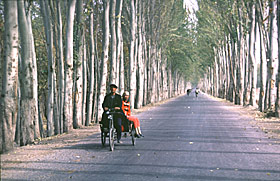 Donkey carts laden with figs, apples and
almonds bounce down biblical-era boulevards, while caravans of camels slowly
disappear into the dunes of the Taklamakan after mumbled prayers for safety in
the ubiquitous mosques.
Donkey carts laden with figs, apples and
almonds bounce down biblical-era boulevards, while caravans of camels slowly
disappear into the dunes of the Taklamakan after mumbled prayers for safety in
the ubiquitous mosques.
In the past 50 years, however, Beijing has tipped the balance with a frontier development scheme - Go West, Young Han. Millions have. Exactly how many is a matter of contention.
Officially, fewer than 40% of Xinjiang's 20 million people are Han Chinese. Still, that's a giant leap from 1949, when the Chinese made up 4%-5% of the population. The shift may be even more dramatic, says a Western diplomat in Beijing, perhaps 60%-65% Han, if you tally all the police and army troops.
All that military muscle is telling. Take two peoples who don't understand each other, plus the perception among locals that the newcomers are dominating the land and the economic development, and it is no surprise that a heavy security presence is on hand to control arguably China's most restive province.
Over the years, there have been isolated outbreaks of separatist violence. The climax came in 1996 and 1997 when riots erupted in several towns and bomb blasts rocked Urumqi, the provincial capital, and even Beijing.
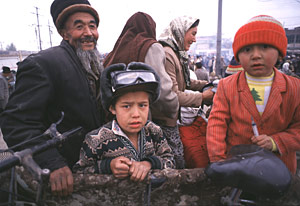 Violent incidents have declined since those fiery days, but that hasn't
stopped Beijing from trying to get some mileage out of Sept. 11. Among its
claims: A so-called Uighur East Tujue network is tightly linked to the Taliban
and has help from other terrorist cells in carrying out various assassinations
and bomb attacks.
Violent incidents have declined since those fiery days, but that hasn't
stopped Beijing from trying to get some mileage out of Sept. 11. Among its
claims: A so-called Uighur East Tujue network is tightly linked to the Taliban
and has help from other terrorist cells in carrying out various assassinations
and bomb attacks.
Most observers discount such claims as puffed-up propaganda. "In terms of terrorism, the record is pretty clear," says Central Asia expert Gladney. "Even official Chinese reports list only a few small incidents, very spread out. It really doesn't seem to indicate some terrorist network."
The concern now is where the scare tactics will lead. The U.S. has steadfastly maintained that the antiterrorism campaign should not be seen as a blank check for regimes to crack down on dissent, but that has not allayed fears of renewed repression.
"China wants to take advantage of the global war on terrorism to legitimize its indulgence in killing, torturing and imprisoning Uighurs," says Turdi Ghoja, president of the Washington-based Uighur American Association.
That said, Beijing's recent posturing - so far at least - remains more hype than substance. "Things have always been bad for Uighurs in China," says one Western diplomat. "Are they worse since Sept. 11? That's hard to say."
There has been much media coverage of the Strike Hard campaign, designed to crush separatists and terrorist cells, and a re-education drive for Muslim clerics. But the former has been going on all year and most arrests - more than 200, according to state media - were made long before Sept. 11.
Meanwhile, the re-education campaign was launched in April and is running, as scheduled, through December. Workers may lose their jobs if found to be praying or fasting at work during the holy month of Ramadan - or at any other time - but that has been the case all along.
Even Turdi concedes that the recent reports of repression offer nothing new. "The Chinese have always been treating the Uighurs as enemies," he says.
Still, one can feel the unsettling shadow of fear stretching from Beijing all the way to Kashgar. At this predominantly Uighur city, close not only to Afghanistan but to another hot spot, Kashmir, anti-Chinese sentiment bubbles just under the surface.
At the same time, it is clear that any fears Beijing might have of Uighurs joining hands with Muslims overseas -the Taliban or otherwise - are largely unfounded. Talk of a pan-Turkic uprising sweeping from Afghanistan across Central Asia is discounted in Kashgar's teahouses. "We may all be Muslims, but we aren't the same people," a man points out.
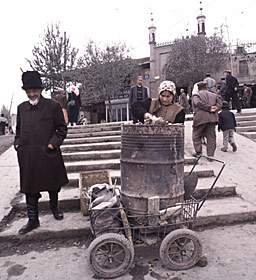 Indeed, as Kabul fell in the days before Ramadan, life continued largely as
before. "The world goes on its way," says Ahmed, the Dubai
businessman, as he savors the aroma from grilled kebabs at his cousin's
restaurant, "but Kashgar never changes."
Indeed, as Kabul fell in the days before Ramadan, life continued largely as
before. "The world goes on its way," says Ahmed, the Dubai
businessman, as he savors the aroma from grilled kebabs at his cousin's
restaurant, "but Kashgar never changes."
The legendary Sunday bazaar, where old men can be seen test-riding camels, is held as always, and the same haunting chants call the faithful to the mosques as they did a millennium ago.
"We are all praying for peace," says one man. Their loyalty, though, isn't so much to fellow Muslims as to other Uighurs.
A common sentiment expressed isn't that the U.S. should halt the war. In fact, many wish it would be extended. "They should go on bombing," says a young student. "We just wish they would bomb China."
Ron Gluckman is an American reporter who has spent over a dozen years in Greater China, roaming the region for a wide variety of publications including Time's Asiaweek, which ran this story in late 2001.
To return to the opening page and index
push here
[right.htm]
